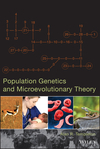 Due to positive mentions from readers and friends I finally got Alan Templeton's Population Genetics and Microevolutionary Theory. I've read a few chapters and skimmed through much of the book, and my current take is that it's a bit too wordy in the exposition. I'd have preferred that there be more technical boxes and a more thorough scattering of compact formalisms. That being said, Templeton is a clear writer and the text is pretty penetrable (I enjoyed the coverage of quantitative genetics especially). Also, he didn't seem to take a kitchen-sink approach, a few themes came in for thorough treatment. If you're interested in familiarizing yourself with this field I still think Principles of Population Genetics is a better bet, but then you know my biases which I stated above.
Due to positive mentions from readers and friends I finally got Alan Templeton's Population Genetics and Microevolutionary Theory. I've read a few chapters and skimmed through much of the book, and my current take is that it's a bit too wordy in the exposition. I'd have preferred that there be more technical boxes and a more thorough scattering of compact formalisms. That being said, Templeton is a clear writer and the text is pretty penetrable (I enjoyed the coverage of quantitative genetics especially). Also, he didn't seem to take a kitchen-sink approach, a few themes came in for thorough treatment. If you're interested in familiarizing yourself with this field I still think Principles of Population Genetics is a better bet, but then you know my biases which I stated above.
Advertisment
It's a sad state of affairs that every such textbook needs an appendix on probability and statistics. Shouldn't we know that stuff before we pick up a textbook like this?
Still, I'll take a look at Templeton's book (I already have Hartl and Clark).
Educate me...i thought that "microevolution" was a term used more often by IDers to describe the types of evolution they are willing to "believe in".
templeton's book is much, much better than principles of pop. gen. because it connects pop. gen to recent developments in genomics.
I like Templeton's organization of the book; it's refreshingly novel. If you like more equations and some in-depth treatments, as Razib mentions, Phil Hedrick's book is probably the best out there, followed by the Hartl/Clark book (their 2nd edition is still the best of the lot).
Industrial strength treatment is found in Crow and Kimura's book, now out of print and out-of-date in some places (e.g., no coalescence theory, no genomics-pop gen connections).
Templeton is using the term "microevolution" simply to note that his book focuses on within-population evolutionary change, not things like speciation. The term "microevolution" is the provenance of biologists and always has been. Some IDer's use the term to denote the fact that they can accept that some evolution occurs within a population but do not accept that speciation occurs (i.e., macroevolution). Ironically then, IDer's use the term "microevolution" but not "macroevolution" to make their internal inconsistencies more apparent.
Thanks for the clarification.